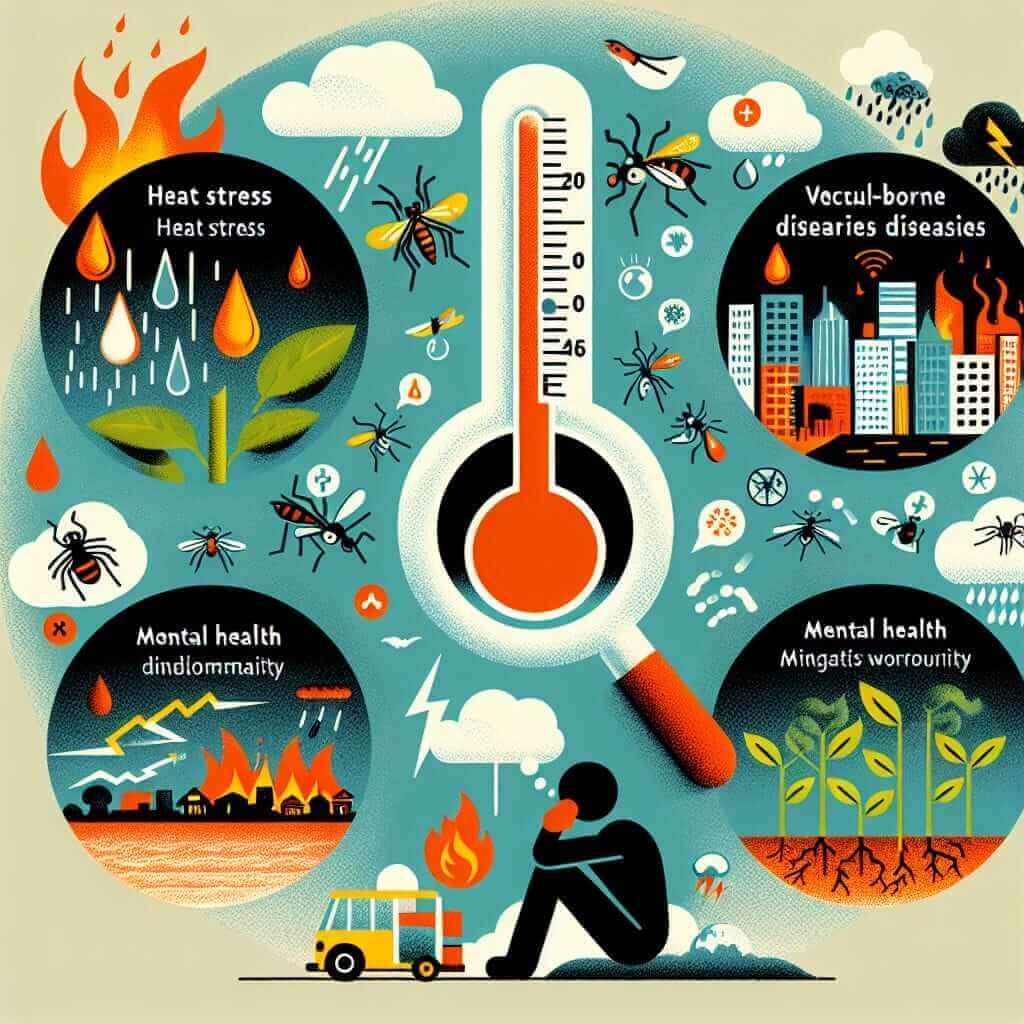The IELTS Reading section is a crucial part of the exam, testing your ability to understand and interpret academic texts. One of the prevalent topics is climate change and its effects. Given its global relevance and ongoing discourse, it’s likely that such a topic may appear in future IELTS exams. In this article, we will delve into “What are the effects of climate change on global health security?”—a topic that has increasingly garnered attention due to the far-reaching implications of climate change on health.
Reading Passage
To better prepare you for the IELTS Reading section, let’s simulate a reading passage based on the topic of climate change and its impact on global health security. This passage is designed to mimic the complexity and structure of an actual IELTS reading text.
Effects of Climate Change on Global Health Security
Climate change is no longer a distant threat but a pressing issue with tangible impacts on global health security. The rising temperatures, increasing frequency of extreme weather events, and shifting climatic patterns pose direct and indirect threats to human health worldwide.
Firstly, the direct consequences of climate change include heatwaves, which can lead to heat stress and heatstroke, particularly among vulnerable populations. The increasing temperatures exacerbate respiratory and cardiovascular diseases, affecting millions globally. For instance, the 2003 European heatwave resulted in over 70,000 excess deaths, highlighting the severe health implications of extreme weather.
Secondly, climate change also has indirect effects, such as altering the distribution of vector-borne diseases. Warmer temperatures and changing precipitation patterns can expand the habitats of mosquitoes, ticks, and other vectors, leading to the spread of diseases such as malaria, dengue fever, and Lyme disease into previously unaffected regions. The World Health Organization (WHO) predicts that climate change could result in an additional 60,000 deaths annually by 2030 due to malaria alone.
Furthermore, climate change affects food security, which is a critical component of global health. Extreme weather events, such as droughts and floods, can devastate crops, leading to food shortages and malnutrition. The Food and Agriculture Organization (FAO) estimates that climate change may reduce agricultural yields by 10-25% by 2050, exacerbating hunger and undernutrition, particularly in low-income countries.
Moreover, the mental health impacts of climate change are becoming increasingly evident. The stress and anxiety caused by displacement due to extreme weather events, loss of livelihoods, and uncertainty about the future can lead to psychological issues such as depression and post-traumatic stress disorder (PTSD). Communities affected by events like hurricanes, wildfires, and floods often report higher incidences of mental health issues.
In conclusion, the multifaceted effects of climate change on global health security are undeniable. Addressing these challenges requires comprehensive strategies that encompass disease prevention, disaster preparedness, and sustainable development to mitigate the health impacts of climate change and protect vulnerable populations.

Questions
Based on the passage provided, attempt the following questions to test your comprehension.
Multiple Choice Question
- According to the passage, what is one of the direct health impacts of climate change?
- A) Increased agricultural yields
- B) Expansion of habitats for mosquitoes
- C) Reduction in malnutrition
- D) Heatwaves leading to heat stress
True/False/Not Given
- The passage states that the 2010 European heatwave resulted in over 70,000 deaths.
Matching Information
-
Match the following effects of climate change with their corresponding health outcomes:
- A) Warmer temperatures and changing precipitation patterns
- B) Extreme weather events like droughts and floods
- C) Displacement due to natural disasters
Options:
- i) Malaria and dengue fever spread
- ii) Increased psychological issues
- iii) Crop devastation and food shortages
Summary Completion
- Climate change affects food security by causing __, which can lead to __, particularly in low-income countries.
Answers and Explanations
-
D) Heatwaves leading to heat stress
- Explanation: The passage explicitly mentions heatwaves and their impact on heat stress and heatstroke.
-
False
- Explanation: The passage refers to the 2003 European heatwave resulting in over 70,000 deaths.
-
- A) i) Malaria and dengue fever spread
- B) iii) Crop devastation and food shortages
- C) ii) Increased psychological issues
- Explanation: The passage links warmer temperatures to the spread of vector-borne diseases, extreme weather to food insecurity, and displacement to mental health issues.
-
droughts and floods; food shortages and malnutrition
- Explanation: The passage mentions that extreme weather events cause crop devastation, leading to food shortages and malnutrition.
Common Mistakes
- Misreading numbers or dates: Always double-check numeric information.
- Missing indirect effects: Remember that climate change’s impact isn’t just direct; it also includes shifts in disease patterns and psychological effects.
Vocabulary
- Heatwave (noun): /ˈhētˌwāv/: A prolonged period of excessively hot weather.
- Vector-borne (adjective): /ˈvektərˌbôrn/: Diseases transmitted by vectors like mosquitoes and ticks.
- Malnutrition (noun): /ˌmælˌn(j)ʊˈtrɪʃ(ə)n/: Lack of proper nutrition.
Grammar
- Conditional Sentences: “If climate change continues to progress unchecked, it could lead to severe health crises globally.”
- Formula: If + subject + present simple verb, subject + will + base verb.
Tips for High Reading Scores
- Skimming and scanning: Practice reading passages quickly to get the general idea (skimming) and then scanning for specific information.
- Note-taking: Jot down key points while reading to help remember crucial details.
- Regular practice: Use diverse reading materials to get accustomed to different topics and writing styles.
By understanding the breadth of climate change’s impact on global health security and practicing with texts like this one, you’ll be better prepared to tackle the Reading section of the IELTS exam with confidence. Good luck!